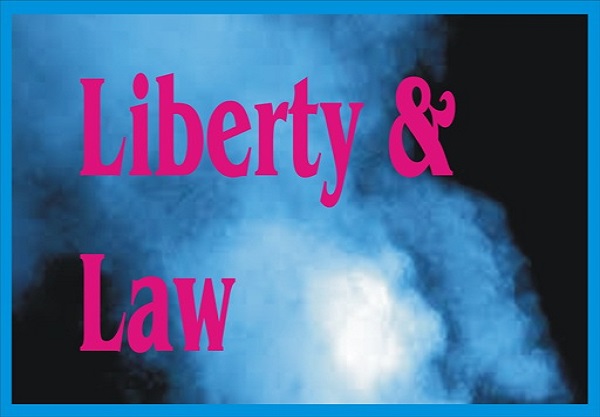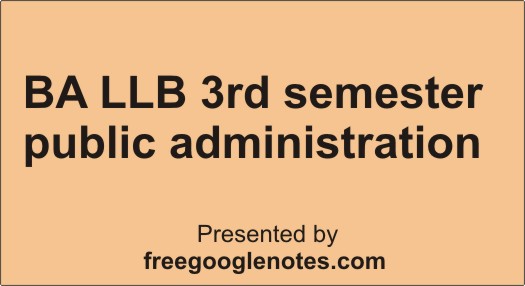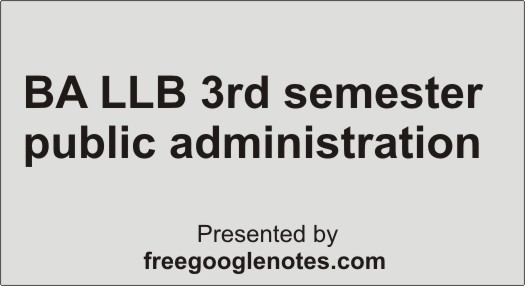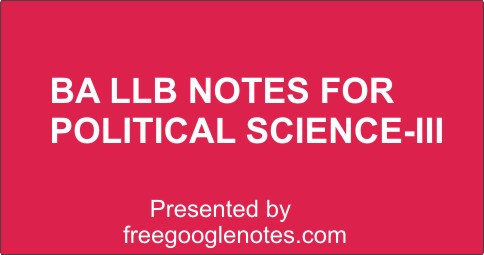BALLB sample question answer Liberty and law: In this post you will read about Explain relations between Liberty and Law, Define law. Also explain the main sources of law,Discuss relations between Law and Morality, Law and Public Opinion ,Explain how liberty can be safeguarded ?
LIBERTY AND LAW
Q. 1. Explain relations between Liberty and Law.
Ans. Relations between Liberty and Law or Sovereign. Liberty is available only in the state. Outside the state there can be no liberty. State defines and protects liberty without which it becomes meaningless. Now the question arises what is the relation of liberty with law and sovereignty. There are two opposite views on this point. Some scholars as of the view that both are opposed to one another, where there is
law there is not liberty and more the laws less the liberty. But other view is that liberty and laws are closely related to one another, where there is no law there is no liberty.
Liberty and Law are opposed to each other. There are scholars who say that liberty and laws are opposed to each other. According to them where there is law there is no liberty because laws put restriction on the actions of the individual and also compel them to do something they do not like or they do not want to do. Individualists and Anarchists are of this view and say that laws limit the liberty of the individual. Individualists want to minimise the functions of the state to maximise liberty o the individual and Anarchists want to do away with the state. According to them, that government is best which governs the least. J.S. Mill was of this view. According to him, “Mankind are much gainer by allowing each other to do what seems good to themselves, than by compelling each other to do as seems good to the rest.” Godwin says that law is the most harmful for individual liberty.
Liberty and Law are related to each other. But these days the above view is not accepted by most of the scholars. Those who consider liberty and law as opposed to each other, do not know the real meaning of liberty. Liberty does not mean absence of all restraints. Liberty is the existence of reasonable restrictions on the actions of man in place of unreasonable ones. Liberty means the freedom to do something worth doing. It is the law which defines liberty and protects it. It is the law which puts reasonable restrictions and creates an atmosphere in which every individual can enjoy liberty. Laski has rightly said, “Where there is no law, there is not freedom.” Where there is no law freedom can be enjoyed only by the rich and mighty, nor by the poor and the weak. It is the law which does not let the stronger encroach upon the liberty of the weaker.
According to Hockings, “The greater the liberty a person desires, the greater is the authority 10 which the should submit himself.” There. can be no liberty outside the state. In a state of nature only the physical power or brute force survives. But in state even the weak enjoys liberty. According to Ritche, “Liberty in the sense of positive opportunity for self development, is the creation of the law and not something that could exist apart from the action of the state.” T.H. Green has rightly said, “Much modern legislation interferes with the freedom of contract in order to maintain the conditions without which a free exercise of the human faculties is impossible” and accordingly he has said that the function of
the state is to hinder hindrances. According to Rousseau, “Obedience to a law which we prescribe to ourselves is liberty.” According to Gettel, “Liberty in any real and dependable sense in possible only if sovereignty exists and becomes more perfect as sovereignity is more completely… organised.”
Thus it can be safely said that law and liberty have close relation and can be summed up as under :
(1) Liberty in the real sense is positive, not absolute or negative. (2) Liberty is possible only in a state, not outside the state. (3) Liberty is created, defined and protected by law.
(4) Laws are.csscntial for enjoyment of liberty because laws create peace and order.
(5) Laws create that atmosphere in which development of human personality is possible and that is also the aim of liberty.
Does every law protect libérty ? Are all laws helpful to liberty ? All laws are not always good. In a democratic set up generally the laws protect and enhance liberty. But in a despotic state, laws are made to crush the liberty of the individuals. During British regime the Government of India made many laws which were against our liberty and interest and they were opposed. Thus only good laws are supplementary to and protector of liberty. Gettel has said that the excess of laws also destroys liberty and excess of liberty also creates anarchy.
At the end it can be concluded that liberty has close relatior, with law and sovereignty. Ultimate aim of both is the same – welfare of the individual and society, development of personality of citizens.*
Table of Contents
Q. 2. Define law. Also explain the main sources of law.
Ans. Law. Man has to act according to law. He cannot act otherwise. Peaceful life is not possible in the society in the absence of laws. It is the jaw that regulates various relationships in the society, protects the life and property of the people, maintains peace and order, delines and protects individual liberty.
Meaning and Definition of Law. Law has been derived from the Teutonic word ‘Lag’ which means definite, permanent. It means definite rule. Thus ordinarily those rules of the society which are definite and are enforced by the state are called laws.
Various definitions of law are given below : According to Woodrow Wilson, “Law is that portion of established thought and habit which has gained distinct and formal recognition in
the shape of uniform rules backed by the authority and power of govemment,”
In the words John Austin, “Law is a command given by a superior to an inferior.”
Holland says, “Law is the general rule of external human action enforced by a sovereign political authority.”
According to Salmond, law is “The body of principles recognised and applied by the state in administration of Justice.”
According to T.H. Green law is “The system of rights and obligations which the state enforces.”
Feature of Law. On the basis of the various definitions of law it can be said that laws are the rules which the state recognises and enforces in respect of various relationships in the society and which are applied in the administration of justice. Following are the main features of law : .
1. Law exist in the state, not outside the state. There can be no law. without the state.
2. Law is concerned only with the external actions of individuals. It is not concerned with his internal actions. It regulates only external behaviour of the individuals.
3. Laws are made, recognised and enforced by the state.
4. Laws are definite and universal. !.aws are applicable to all the members of the society. Law is not made for a particular individual.
5. Laws are made to regulate the various human relations in the society for social good, for peace and order, for the protection of life, property and liberty of the people. I
: 6. Law has the force of the state behind it. If an individual violates the law, he is liable to be punished by the state.
Sources of Law. Generally the law are made by the legislative wings of the government, but there are some other sources also, which make the laws. Following are the main sources of law :
1. Customs and Tradition. Most of the laws have their origin in customs and traditions. i. is the most ancient source of law. In the beginning the members of the society maintained their relations on customs and traditions. Customs and traditions are those rules which have developed with the passage of time on account of their usefulness. When some disputes arise about these customs and traditions, due to changing circumstances, the government has to step in. It defines them, makes them certain and gives them the shape of law. No government,
however despotic, can dare to make laws against the customs and traditions. Most of the laws are based on customs and traditions. – Common law of England is based on customs and traditions.
2. Religion. Another important source of law from the ancient times has been religion. It plays an important role in the life of man. People do not obey a law which is against their religious beliefs. A custom or tradition when supported by religion is obeyed most. In ancient times. laws were made according to religious beliefs. There was a time when even the king had to seek recognition from religious head. There used to be Priest Kings. Even today many laws are based on religion, particularly laws relating to marriage, divorce, succession and irheritance. India has Hindu Law, Muslim Law, etc. It is an important sources of law.
3. Judicial Decisions. In modern times judicial decisions are an: important source of law. Law courts decide disputes that are presented.before them, according to the laws. While doing so they have to interpret. the laws and make the laws clear and definite. Sometimes through interpretation of laws, they give a new shape to the laws, Decisions and interpretations given by the law courts become precedents, and take the shape of law for the people and the law courts for future cases. Through its decisions judiciary creates many new laws.
4. Equity. Equity is another source of law from ancient times. – Many times the court has to hear novel type of cases about which there is no law in force. Such cases are decided by the court on equity, which means fairness, justice, honesty, impartiality. That case is decided on the basis of what appears to be just to the court in the circumstances of the case and the laws in force. The decision given on equity, becomes law for similar types of cases for future. . .
5. Scientific Commentaries by Jurists. Eminent jurists, advocates, scholars and experts on constitutional law give their opinion and commentaries on existing laws, their positive and negative points, scope of amendments in the laws, and desirability of some new laws. These commentaries have their impact on the politicians, law-makers and even on the judiciary. These commentaries play an important role in making, unmaking or changing the laws.
6. Legislature. In the modern times, legislature is the most important source of law. Every government has its legislative wing which makes new laws, unmakes outdated laws and also makes changes in The laws according to the need of time. In democracies the legislatures
are composed of members elected by the people. These elected representatives make laws according to public opinion and have to give due consideration to the customs and traditions, religious beliefs and need of time. Thus people themselves make the laws through their representatives.
Q. 3. Discuss relations between Law and Morality, Law and Public Opinion :
Ans. Law regulates the relations between the individuals, between the individuals and the state. We cannot think of a state without law because it is through the laws that the will of the state is expressed and fulfilled and peace and order is maintained. It creates that atmosphere in the society in which the individual can attain his best self. Law are obeyed because they are good, they are for the benefit of the individuals, because they protect the life and property of the people, and they are liked by them. Laws have also relation with morality and public opinion. Law contrary to morality and public opinion are not easily obeyed by the people.
A. Relation between Law and Morality
Political science and Ethics have close relation and in the same. way law and morality are closely related. There has been close relation between the two in the ancient times and even today. Before the emergence of state, the people used to regulate their relations according to the principles of morality. Later the state recognised many principles of morality and gave them the name of laws. In ancient Greece the end of the state was considered to be the highest moral development of the people. According to Plato, “The best state is that which is nearest in virtue to the individual.” Morality has great impact on the life of the individual and even affects his conscience. Individual do not want to do anything against his conscience. He wants to do only that thing which is morally good. Moral principles are for the development of the life of individual and that is the aim of the law also. According to Foy what is morally wrong cannot be a politically right. Ivor Brown considers political science to be a developed form of Ethics. Moral principles are incomplete in the absence of political principles and political principles are meaningless is not accompanied by moral principles. According to Gilchrist”…. The acts of the state must have an integral connection with the moral end of man.” Laws should be such that help in the fullest moral development of the life of the individual. A law which is in conformity with the moral principles will be willingly obeyed by the
people. Any law which is against the morality will not be con good by the people and will be resisted.
Difference between Law and Morality. But there is also a d difference between the two. The difference is clear from the following: points :
(1) Scope of morality is wider than that of the law. Morality touches the whole life of man, his external as well as internal actions. Morality tells us not even to think evil of others. But law is concerned only with the external actions of the man. Law is not concerned with what the man thinks. L (2) Morality has no legal sanction behind it. It means if a man acts contrary to moral principles he cannot be punished by a law court. But law has legal sanction behind it. If a law is violated law courts punish the person who has violated the law.
(3) Law is more clear and definite as compared to principles of morality. Many times moral principles are vague, indefinite and not clear. People can have different opinions about moral principles. But law is written definite and clear.
(4) Moral principles are not uniform and universal. One moral principles does not apply to all the people everywhere. They can differ from man to man and from place to place. But laws are the same and apply equally all the people. What is illegal in one part of the territory of a state cannot be legal in another part.
(5) There are some acts of the people which can be against the law but may not be against morality. For example if a man breaks traffic rule, he can be punished by law but morality has nothing to do with it. There are some actions which are against morality but may not be against the law. To think evil of others is against moral principles but it has nothing to do with the law.
Conclusion. We can conclude that law and morality are different from one another, but are closely related. A law based on moral principles will be widely obeyed and will give good results. A law against moral principles will be disobeyed. Similarly law defines principles of morality and protects them by giving them legal shape. Where there appear some defects in moral principles, law tries to remove these defects. Both are complementary to on another.. B. Relation between Law and Public Opinion
Law and Public Opinion are also closely related. Laws are based liron public opinion. Public opinion is the opinion of the majority of
the society but is for the good of the whole society. What is good as the whole society is naturally liked by the society and the law accordance with the good of the whole society will be respected and obeyed by the society. People obey laws “not because of the fear of punishment, but because it is for their benefit, for their welfare, laws protect their life and property, because they create peace and order, because they create an atmosphere in which individual can make his fullest development. According to T.H. Green “will, not force, is the basis of the state.” It means the state is based on the will of the people and the laws are based on the public opinion. If a law is made against the public opinion, the people will considerate harmful and will resist it, will defy it. Even in a despotic state, laws made against public opinion cannot last long, somewhere they are opposed earlier, somewhere they are opposed later. In a democracy, the government which does not make laws according to public opinion and does not run the administration according to their wishes, is bound to fail and is not voted to power again. People oppose bad laws and even agitate to get them repealed. According to Hume all governments. however bad they may be, are ultimately based on public opinion for their authority. No government, however powerful it may be, can stand against public opinion. A law is obeyed only when the people feel convinced that it is in their benefit. Thus it is clear that law and public opinion are closely related and laws have the ultimate sanction of public opinion behind them.”
Q. 4. Explain how liberty can be safeguarded ?
Ans. Liberty is very essential for the development of life of individual. But it always remains in danger. Generally the executive and unsocial elements always try to interfere with the liberty of individual. It needs many safeguards and it is said that constant vigilance is the price of liberty and it is not easy to keep liberty protected. A democratic set up is essential for giving and protecting liberty of the individuals. Many other steps have also to be taken for safeguarding the liberty.
Safeguards of Liberty
Following steps. should be taken for the safeguard of liberty :
1. Democratic set up. Democracy is the first essential step for the safeguard of liberty. It is only in a democratic set up their liberty can be given to the people to the maximum extent. In other forms of government so much liberty is not given to the citizens. Liberty and equality are two main pillars of democracy. In a monarchy or in a
despotic government individuals are given minimum liberty. In democracy the representatives to the people run the administration, they are responsible to the people and they cannot easily encroach upon liberty..
2. Declaration of Fundamental Rights. It is desirable that the rights and liberties of the people should be constitutionally declared and protected. According to Laski, liberty is the credit of rights. When the rights are included in the constitution, they become well known and it becomes difficult for the executive or the legislature to encroach upon them. Declaration of the fundamental rights in the constitution also minimizes the possibility of making frequent change in them. They remain protected also because the judiciary would not let any encroachment upon such rights.
3. Decentralisation of Powers. Decentralisation of powers also safeguards liberty. Concentration of powers in the hands of the one person or a body is bound to make him or that body tyrannical. Concentration of powers leads to dictatorship. More decentralised the powers are, more safeguarded the liberty of the people remains. Powers of administration should be distributed amongst as many bodies as possible, for example in central government, provincial government, local bodies like municipal committees and village panchayats. Exercise of powers by the local bodies creates and promotes consciousness of liberty amongst the people and that also helps in the safeguard of liberty.
4. Separation of Powers. Theory of separation of powers. is also helpful in the safeguard of liberty Concentration of all three powers – legislative, executive and judicial in the hands of one person is very harmful for liberty and for democracy. It makes the person despotic. Judicial and executive powers must be separated from one another. If the same person is allowed to exercised both executive and judicial powers, he will act arbitrarily and the liberty of the individual cannot remain unassected. Madison has rightly said that the concentration of all the three powers in the hands of the same person or body of persons is the very definition of tyranny and in tyranny there is no room for liberty.
5. Rule of Law. To safeguard liberty it is desirable that the principle of rule of law should be adopted, not the rule of man. It means that There should be no person above law and all persons irrespective of
their status in the administration and in the society should be equal in the eyes of law and equal laws should apply to all. All person should be equally liable to be punished for the violation of law. There should be no privileged class in the society. According to MacIver, the rule of law creates a feeling amongst the people that the government is a part of the society and will work according to law. Rule of law is an essential safeguard of liberty.
6. Independent and Impartial Judiciary. To keep liberty safeguard it is also very important to establish independent and impartial judiciary. Whenever the individual is wronged and cannot get justice al the hands of the executive, he knocks at the door of judiciary. If the judiciary is under the influence and pressure of the executive or is not impartial due to some other reason, it cannot give justice and the liberty of the people will become meaningless. Judiciary has always played the role of the protector of liberty and rights of the people and this can be done by an independent and impartial judiciary.
7. Free and Impartial Press. Press is the watchdog of rights and liberties of citizen in democracy. Whenever the executive makes an attempt to curb the liberty of the people or the legislature tries to make law dangerous for liberty, it is the press that has to raise voice against it, creates public opinion and compel the executive or legislature not to go ahead with its proposal. Free and impartial press imparts political education to the people and keeps them vigilant. If the press is neither free no impartial liberty of the people will vanish soon.
8. Economic Equality and Security. Liberty and equality go together. Political liberty in the absence of economic equality is a mere myth. Laski has said, “Were there are rich and poor, educated and uneducated, we always find a relation of master and slave.” A poor man cannot enjoy his liberty. Every man should be sure of minimum standard of living, he should be sure of good conditions of work and economic security in case of illness, old age and disablement. A poor man does not enjoy even social liberty and social equality. Mathew Arnold has said, “Economic inequality materialises over upper class, vulgarises over-middle class and brutalises over lower class.” Where there is much gap between the rich and the poor, there can be no liberty for the poor.
9. Well organised Political Parties. Political parties also play an important role in the safeguard of liberty. Opposition parties act as
watchdog on the activities of the ruling party and are ready to criticise its every wrong step. They criticise the government whenever it tries to encroach upon the liberty of the people. But the political parties should be disciplined, well organised and should be based on sound political and economic basis. Parties based on communal, regional and linguistic basis can be harmful to the nation. ;
10. Vigilance of the People. According to Laski, “Etemal : vigilance is the price of liberty.” The real and most effective safeguard of liberty is the vigilance of the people. If they are conscious and alert about their freedom and are ever ready to raise their voice against any encroachment on it, nobody can dare destroy it. Whenever the citizen are careless or indifferent about their rights and freedom, some one or the other will take them away. Laski has said , “The threat of contingent march is a safeguard against the abuse of government.” In the opinion of Jafferson, “No country can preserve its liberties if its rulers are not warned from time to time that the people preserve the spirit of resistance.” Laski has also said, “It is the proud spirit of the citizens, rather than the letter of the law, that is the most real safeguard of liberty.”








